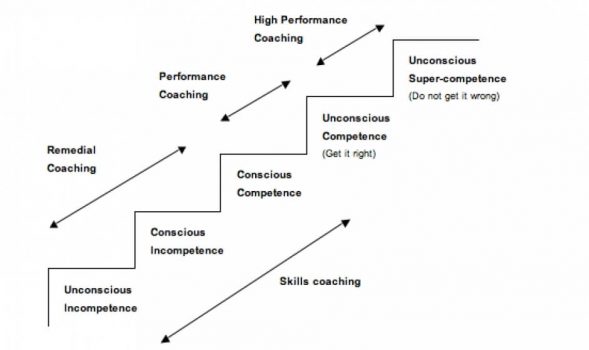Business Coaching
Business coaching is a collaborative, solution focussed, results oriented and systematic process in which the coach facilitates enhancement of performance, life experience, self-directed learning and personal growth from the coachee.
BSI Business Coaching involves 4 stages:
- Establishing objectives
- Situational analysis
- Development of coaching plan
- Implementation of coaching plan

1. Establishing Objectives
This stage of the process involves a one-on-one session between the individual and coaching champion to identify the “Coaching outcomes” in the following areas:
- Skills & Performance development
- Business issues management
- Career Planning
The objective may be remedial, performance or high performance coaching. (see above graph)
2. Situational Analysis
- Use of interviews / research and diagnostic tools relative to agreed outcomes identified in Phase 1 Establishing Objectives.
- Diagnostic tools would be selected from our extensive inventory, such as:
- Behavioural Styles (DiSC)
- Communication Effectiveness
- Conflict Resolution Effectiveness
- Leadership Effectiveness
- Life Styles Inventory (LSI 1 & 2)
- Management Effectiveness
- Problem Solving Self Feedback
- Risk Style Profile
- Teambuilding Effectiveness
- Time Management Effectiveness
3. Development of Coaching Plan
- Prioritisation of objectives
- Identification of short-term, medium term and long term actions
- Involvement of Program Champion
- Alignment to individual and organisational goals
4. Implementation of Coaching Plan
- Regular review of action plans through face to face / telephone / email communication
- Development of monthly / weekly action plans
- Identification of other stakeholders who may need to be involved
- Identification of relevant articles, recommended reading and training
Business coaching is a collaborative, solution focussed, results oriented and systematic process in which the coach facilitates enhancement of performance, life experience, self-directed learning and personal growth from the coachee.
BSI Business Coaching involves 4 stages:
- Establishing objectives
- Situational analysis
- Development of coaching plan
- Implementation of coaching plan
Role Clarification:
The Coachee is responsible for:
- Decision making
- Developing solutions
- Implementing the actions to produce the desired change in performance and individual behaviour
The Coach is responsible for:
- Observing behavioural / performance issues
- Facilitating reflection and clarification of situations, skills, and goals.
- Providing additional perspective and insight into alternative approaches through honest and constructive feedback.
- Managing the coaching program
Both parties are responsible for achieving the agreed Coaching outcomes
Life Styles Inventory – LSI 1 & 2
Based on a combination of respected psychological and psychometric theories, the LSI measures the thoughts and attitudes which motivate your behaviour, how you relate to others as well as how you solve problems and make decisions. LSI can be used in conjunction with both coaching and training programs. LSI 1 reveals and measures the thinking and behavioural styles that help or hinder you in fulfilling your potential. You can use what you learn to initiate positive changes in how you think and act – changes that can increase your personal and professional effectiveness.
The LSI 1 is a self-report instrument while the LSI 2 provides objective feedback on an individual’s behaviour patterns as interpreted by others. Combining these can help to more accurately assess your strengths – as well as areas in which you may want to improve. And the LSI provides a confidential, reliable method of gathering feedback, identifying ‘blind spots’ and a non-threatening way of presenting them.
The LSI distinguishes and measures 12 key thinking patterns, or styles, that are either effective or ineffective. The LSI results are plotted on a circumplex, or clock, thereby creating a visual profile of your current thinking patterns in each of the 12 styles.
- constructive styles include achievement, self-actualising, humanistic-encouraging, affiliate
- passive/defensive styles include approval, conventional, dependent, avoidance
- aggressive/defensive styles include oppositional, power, competitive, perfectionisti
Completing your LSI is the first vital step in the process of changing your behaviour. Combined with coaching LSI promotes lasting performance change and improvement by increasing personal understanding of your thinking and behaviour.
Effective LSI debriefing and performance coaching is tailored to the needs of the individual or group. Often, raising awareness, generating acceptance and encouraging action requires significant knowledge, skill and experience. All BSI coaches are LSI accredited with a wide range of experience in helping transform both individuals and organisations.
BSI LSI coaching can assist in the development of:
- leadership effectiveness
- increased ability to cope with pressure and change
- achievement of self-set goals
- flexible and creative thinking
- improved relationships with others
- greater motivation to initiate change and make things happen
A typical LSI Coaching program would consist of:
- The individual completing both the LSI 1 & 2 assessments (self report and colleague feedback)
- This is followed up with two 1½ hour debrief sessions. The first session is to help the individual understand their results and the focus of the second session is on action planning.
- This would be follow up with six 2-hour performance coaching sessions and development program over a period of 6-12 month with follow up phone calls.

